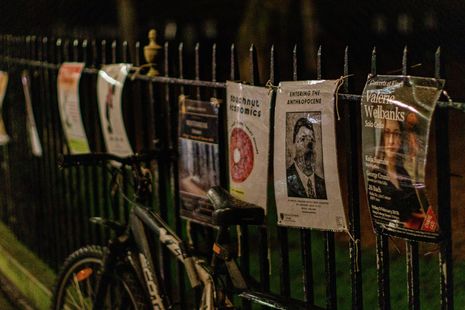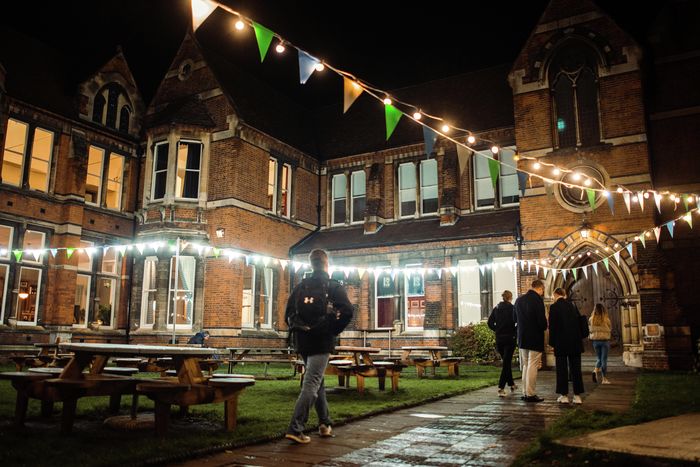What is originality, anyway?
Jamilla Wichmann argues that the emphasis on originality in the humanities at Cambridge can have harmful side effects

Cambridge holds originality as part of its admissions criteria. Whether it’s above-average grades or a shockingly unique personal statement, a push on individuality remains consistent.
Writing as a humanities student, and an English student at that, I can testify that my degree rests on me having an authentic, distinctive voice. But in an environment which is constantly asking for the newest big discovery, does the pressure for authenticity have an adverse effect?
“It shifts from a rivalry of skill to a battle of inventiveness”
Having started my studies at Cambridge this Michaelmas, the wide range of characters here was immediately apparent. Be it in lectures, seminars, formals, the diversity of the people around me created an environment I quickly fell in love with. Competition flourishes in settings like this, with annual exam ratings fuelling a slightly worried but eager drive to keep on top of work and revision. But for us students with essay-based degrees, originality is an extra pressure attached to this.
Of course, as a student of literature and its criticism, I wholly acknowledge the importance of original writing, especially with the dramatic rise of AI platforms like ChatGPT. In a time where literature is being challenged by algorithms, originality is more important than ever. I believe it should be a key part of the study of all humanities, and encouraged for the sake of self-exploration and self-expression. Yet in conjunction with the university’s competitiveness, it can become problematic. It shifts from a rivalry of skill to a battle of inventiveness. Who can come up with the most daringly outlandish thing to say? It is no longer an academic competition but something underlying, something deeper – who is the most unique person? Who can think differently, and therefore, better, than everybody else? In the context of university work, this is merely an uncomfortable inadequacy. But in the public sphere, what is often just a plea for attention can swiftly turn radical in this way.
“To force this individuality undermines its very definition”
For students still becoming accustomed to adulthood, this competition of authenticity has the potential to leak into our self-identity, causing insecurity, if not worse. Authenticity requires creativity, which, unlike most skills, isn’t something that can necessarily be learned.
I don’t entirely blame Cambridge; this desire for originality is a defining characteristic of this online age, with each new trend guaranteeing five minutes of being seen as different from the crowd. Performativity is huge in our generation; we don’t seem to be able to go on a run without a quick Strava story on Instagram. In its essence, individualism is encouraged, framed a positive on the whole. But to force this individuality undermines its very definition – “of undisputed origin and not a copy; genuine”, in other words, not an act.
Fortunately, fighting this complex is easier than you may think. It rests on defining your own authenticity – what does your most genuine self look like? For me, it’s prioritising my own values, centring my personal system of validation, and, crucially, remembering to do so. Authenticity means owning your own being, and part of this requires embracing the differences of your flaws. This is where genuine authenticity is born, and is far from forcing ingenuity. So, if you’re reading this, remember that true authenticity lies within. A push for originality can quickly become an asset, giving space to explore our identity. When we stop trying to fit an image and instead practice acceptance, we become the best versions of ourselves, both personally and academically. In this way, Cambridge’s culture of individuality can be to our benefit.
 News / Judge Business School advisor resigns over Epstein and Andrew links18 February 2026
News / Judge Business School advisor resigns over Epstein and Andrew links18 February 2026 News / Hundreds of Cambridge academics demand vote on fate of vet course20 February 2026
News / Hundreds of Cambridge academics demand vote on fate of vet course20 February 2026 News / Petition demands University reverse decision on vegan menu20 February 2026
News / Petition demands University reverse decision on vegan menu20 February 2026 News / CUCA members attend Reform rally in London20 February 2026
News / CUCA members attend Reform rally in London20 February 2026 News / Caius students fail to pass Pride flag proposal20 February 2026
News / Caius students fail to pass Pride flag proposal20 February 2026










